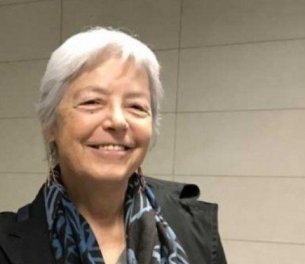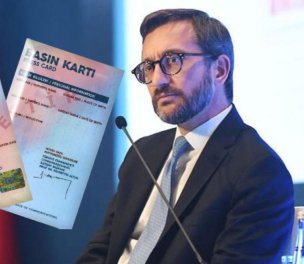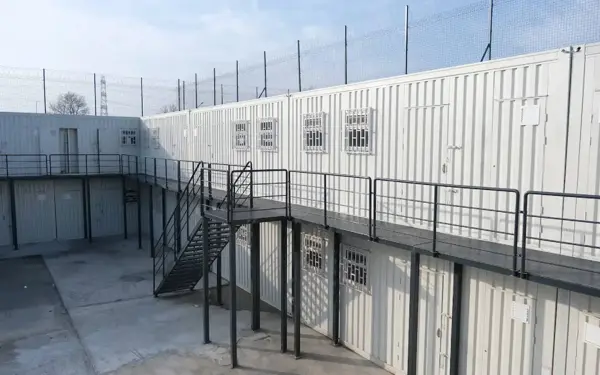Click to read the article in Turkish / Kurdish
IPS Communications Foundation Chair and bianet Project Advisor Nadire Mater is one of the hundreds of journalists who have been waiting for the renewal of their press cards.
Holding the right to have a permanent card before the regulation change in 2018, she had been deprived of this right for two years. The lawsuit Mader filed against the Presidency Communications Directorate is still continuing.
Press cards, which are indispensable for journalists to access news, to report and to enter news environments, have become a practical means of pressure on journalists for the government in recent years. The Communications Directorate, which was authorized to issue press cards to journalists in 2018, hasn't renewed press cards of 1,371 journalists, canceled press cards of 1,238 journalists and left the applications of 220 journalists hanging since then.
"I asked about the press card to relevant places in Ankara and İstanbul many times, my attorney Meriç Eyüboğlu's written application was left without a response. I don't know what happened to the permanent press card I had had since 2007 and it didn't become turquoise. There is neither a response nor the card," says Mater.
"The issue is before the judiciary," she says. Mater is not the only one who filed a lawsuit against the Communications Directorate.
"A mass rejection attempt"
"I think this is also a part of the struggle for the authority to issue press cards to be given to journalism organizations," she says about her lawsuit. "Because canceling press cards and not issuing them clearly shows the wrongness of the state's involvement in this.
"Journalism is an activity that needs to be done independently from all centers of power, not one that requires state approval. Previous governments would also resort to ways such as delaying the issuance of cards or not renewing cards but a mass rejection attempt has been the privilege of this government.
.jpg)
"This is censorship and it causes self-censorship in some cases. [Press cards] are a must in journalism practice; it is the first step that gives assurance to news sources at all levels. Let's remember the share of the press card in the killing of our journalist colleague Metin Göktepe: Police started their attack by saying, 'Show your card.' Now, they don't let those who don't have a card in meetings, sometimes they don't even accredit cardholders.
"Journalists should receive their cards on the day they start working; this is an assurance for both them and news. As journalists, journalism organizations, we should make our voices heard everywhere, including the judiciary, we should save press cards from being used as an instrument of the state's policies to control news reporting."
Ministry employees made "journalists"
"After the application of the Contemporary Journalists Association, the Council of State found expressions in the Press Cards Regulation such as 'doing works, behaving or forming habits that harm the dignity of the press profession' and 'acting in violation of national security or public order or adopting these behaviors as a habit.'
"In its decision, the Council of State said, 'Regulations with such expressions might cause the press cardholders to practice their profession under pressure and with concerns, and for this reason, the mentioned expressions might lead the press to be prevented from fully fulfilling its duty.'
"With this decision, the Council of State also stopped the distribution of press cards to staff at all levels at ministries. Look, on the one hand, there are hundreds of journalists whose press cards are not given, and on the other hand, there are those who work at ministries and are made 'journalists'."
CLICK - Council of State annuls 'journalist grata' regulation on press cards
"We don't have an interlocutor"
Meriç Eyüboğlu, Mater's attorney, notes that she has been a journalist since 1981 and had a "permanent press card" for nearly 20 years and says there are many journalists in a similar situation.
About the petitions she made to the Communications Directorate, she says, "We couldn't receive any response to our applications. Because we don't have an interlocutor."
They have been following the process through Communications Director Fahrettin Altun's emails, she says. "As it will be recalled, he had stated that the evaluation was carried out 'in a delicate way to protect the reputation and prestige of the press card and in-depth inquiries were being made'."

Emphasizing the state's desire to renew something that is called a "permanent press card," Eyüboğlu says, "According to this account, we need to believe that this extraordinarily 'deep' inquiry about Nadire Mater couldn't be completed in two years, eight months and 18 days.
"Actually, the need to renew press cards that are issued to people who spend long years in the job like Nadire Mater indefinitely / for life is another peculiarity. Because the return of a press card depending on the active conduct of the profession is out of the question for the permanent press card. The regulation describes it as an acquired right.
"The regulation should be completely changed"
Eyüboğlu says that the justification of the Council of State ruling that found parts of the regulation "ambiguous" reveals "both the general approach of the Regulation and the approach of the Presidency Directorate of Communications, which further expanded the limitations in the Regulation to the detriment of journalists."
"The ambiguity in the regulation is, in practice, further expanded against freedoms. In article 6 of the Press Card Regulation entitled 'basic principles to be sought in people to be issued a press card,' it is listed who can have this card.
"Whether they really do journalism,' whether they have ties to a terrorist organization,' 'whether they have an attitude harming the dignity of the profession,' which Fahrettin Altun listed in his social media posts, are not included in the principles to be sought in people to be issued a press card. Moreover, it is understood from his statements that the 'in-depth inquiries' are not limited to these and various criteria like these are also examined!
"Of course, the Communications Directorate doesn't have the right and authority to exercise an authority that is not granted to it by the regulation, making new additions to, changing or expanding the conditions listed to issue a press card. But these sentences I make are too naive in a 'Fait Accompli' era.
"Consequently, the justification of 'the evaluation is underway,' which has been going on for two years for some journalists, shows that there is no framework/criteria that are equally applied for everyone, objective and measurable and this process is shaped arbitrarily. For this reason, it's not enough to get results in the lawsuits we filed, the regulation should be completely changed."
Press cards in Turkey and in the worldBefore 2018, press cards would be issued by the General Directorate of Press and Information, which was affiliated with the Prime Ministry. Since 2018, the turquoise press cards have been issued by the Presidency Communications Directorate. The Press Cards Regulation, which came into effect on December 14, 2018, has been the 14th press card regulation since 1947. In the world, press cards are generally issued by trade unions. Journalists oppose being "journalists of the state" almost everywhere in the world. Because once they acquire the "right" to issue press cards, they exercise the "right to not issuing press cards." This is the purpose anyway; interfering with news through press cards and keeping censorship and self-censorship in practice. England, Finland, Italy, Croatia, the Netherlands, Norway, Sweden and Austria are among the countries where press cards are issued by the trade unions. In Germany, there is no single authority that issues press cards. In China, press cards are issued by the state. Journalists experience delays and cancellations in the issuance of press cards, can be blacklisted, tried and put in prison. |
(HA/VK)




















